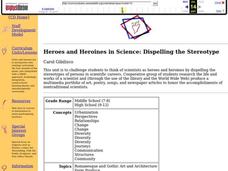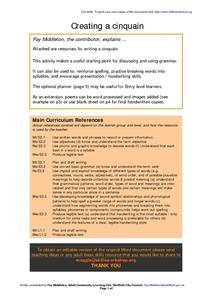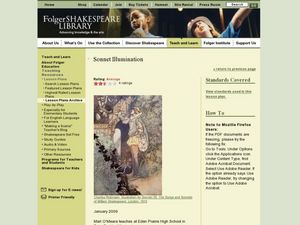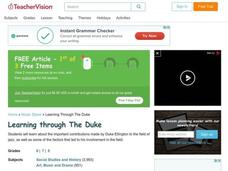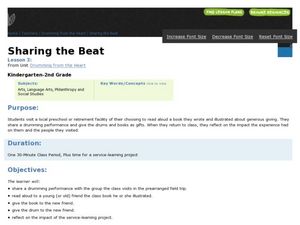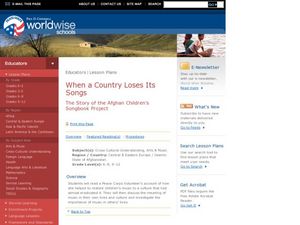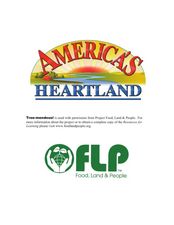Curated OER
Remember the Bridge: Poems of a People
Fifth graders explore poems of African Americans. They research a famous African American, write a report, create a timeline of events in African American history, create a map of the New World, and research Molly Walsh. After...
Curated OER
Heroes and Heroines in Science: Dispelling the Stereotype
students think of scientists as heroes and heroines by dispelling the stereotypes of persons in scientific careers. They work in cooperative groups to research the life and works of a scientist and (through the use of the library and the...
Curated OER
Heroes and Heroines in Science: Dispelling the Stereotype
Students describe and illustrate a stereotypical scientist. They work in cooperative groups to research and produce a portfolio of work honoring a randomly chosen nontraditional scientist. Students create a presentation about their...
Curated OER
Environmental Destruction in Vietnam
Students watch video clip on Environmental Destruction of Vietnam, select and discuss passages from essay, Resuscitation of the Dead Earth, that emphasize destruction to the land, and write essay on whether United States should have been...
Curated OER
The Arts of Africa, Asia and the Middle East: An Exploration of Art, Music and Film
Students examine the arts of the Middle East, Asia and Africa. After viewing films, they discuss the views of the various characters and identify the differences in the cultures presented. They also use the internet to evaluate various...
Curated OER
Dragons In Chinese Folktales And Art
Students investigate and discuss the use of the dragon in Chinese folktales and art in this middle school lesson plan introducing Chinese art and culture. Lesson extensions are included for additional activities.
Curated OER
It's All in the Air
Pupils examine air quality. They test the air for visible pollutants by observing jars for one week and compare and contrast the data they collect. After comparing and contrasting the data, they graph the results of pollution collectors...
Curated OER
I See The Rhythm : The Study of Blues and Jazz
Students gain an appreciation for various types of music. Using the music of the past, they compare it with the music of today. In groups, they research periods in which blues and jazz were most popular and write their own piece of music...
Curated OER
Younger Generation
Learners discuss the composer Aaron Copland and the lyricist Ira Gershwin and their significance in/contributions to American music of their time while singing the song "Younger Generation" in the choir setting. Emphasis is placed on...
Curated OER
The English Sonnet: Michael Drayton
Young scholars discover literature by conducting a free writing experiment. For this sonnet lesson, students read the sonnet "The Parting" and compare it to modern-day songs about breaking up. Young scholars listen to pop music in...
Curated OER
Creating a Cinquain
In this Language Arts worksheet, students read about how to create a cinquain poem. Students read an example and complete a graphic organizer to help guide them in writing their own.
Curated OER
For Thy Sweet Love Remembered Such Wealth Brings
Young scholars read sonnets and choose one which contains words or phrases that create an emotional reaction to study the Shakespearean language. In this Shakespearean sonnet lesson, students read Shakespeare sonnets and circle words...
Curated OER
Sonnet Illumination
Pupils create presentations of digital sonnet illuminations along with sonnet research. In this Sonnet lesson, students view images, colors, and listen to sounds of their own choice to illuminate Shakespeare...
Curated OER
Beautiful Ohio
Third graders read the poem, Beautiful Ohio, discuss it and then write their own descriptive songs/ poems about nature and the environment.
Curated OER
Learning through The Duke
Students examine the important contributions made by Duke Ellington to the field of jazz, as well as some of the factors that led to his involvement in the field. As they explore the language of the 1920's, connections will be drawn...
Curated OER
Giving and Sharing Gifts From the Heart
Students discover the value of sharing and giving. In this philanthropic lesson, students create a storybook, then present it to preschoolers or the elderly, and leave them with the book and other gifts.
Curated OER
Clerihew Dances III, 4 and 5
Third graders relate dance movements to chants. They tap out the rhythm of poetry on different body parts.
Curated OER
When a Country Loses Its Songs
Students explore music as a cultural tradition. In this global studies lesson, students consider the implications of the loss of childhood songs to a cultural group. Students determine the type of musical "treasures" that are part of...
Curated OER
Connotation: "My Papa's Waltz" by Theodore Roethke
What's happening in this poem? Have your high schoolers participate in an activity about connotation and denotation. They apply the concept of connotation to a reading of Theodore Roethke's poem "My Papa's Waltz." Lead a discussion about...
Curated OER
Presentations Come Alive!
Partners create oral presentations about a short story or poem incorporating audiovisual aids. Then they make presentations to their classmates. Linked story map will help guide readers' organization of their presentation;...
Curated OER
I am Special and You are Special Too - Project Children L.E.A.D.
Eighth graders recognize what makes them special through class participation and discussion of rap music, writing a poem about themselves, and designing their own special hat while working in groups.
Curated OER
Tree-mendous Game
Young scholars play a game where they classify the different characteristics of trees. In this tress lesson plan, students also use tree vocabulary and describe benefits of trees.
Curated OER
Historical Background Leading to the Declaration of Independence
Students examine why, when our Fathers, signed the Declaration of Independence they were placing in jeopardy their freedom, property and lives.
Curated OER
Mood
In this mood activity, students read a passage and define the theme, mood, and purpose of what they read. Students complete 3 questions.


